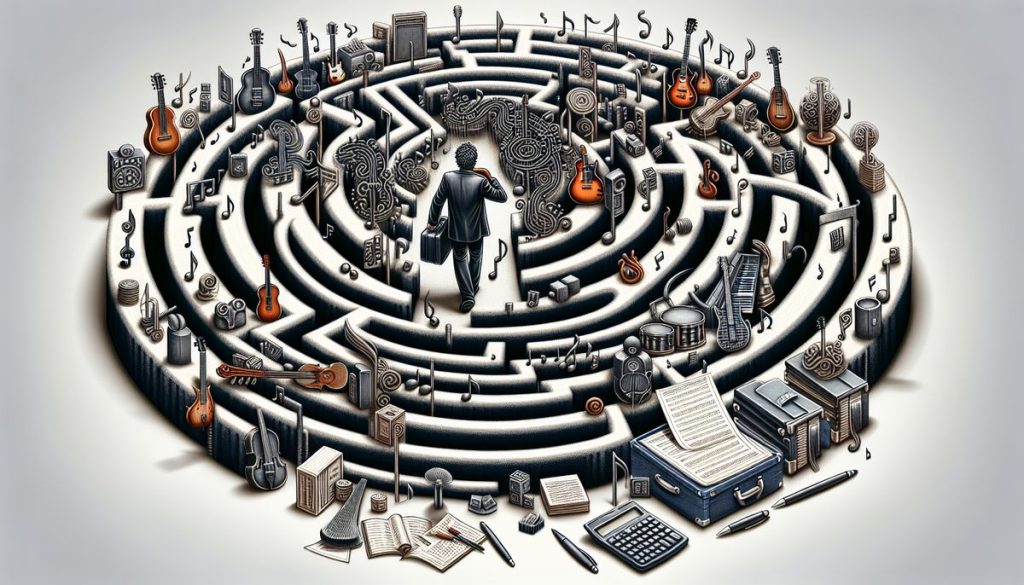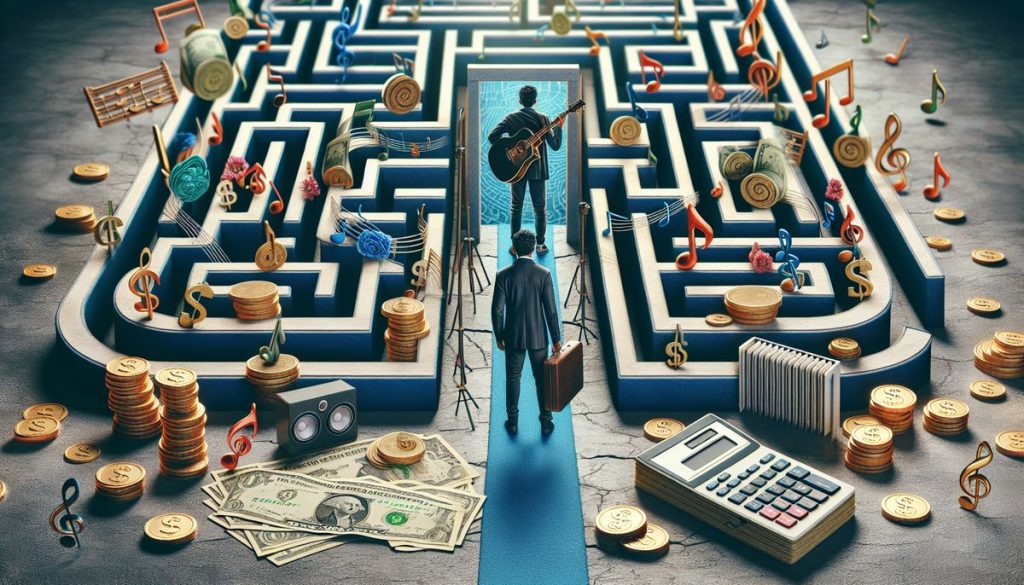Navigating the Music Industry: A Guide to Financial Literacy for Emerging Artists
Written by DJ Prodigee on Tue Mar, 2024
The music industry can be as complex as it is exciting, especially for emerging artists who dream of turning their passion into a sustainable career. Financial literacy is a critical chord in the melody of success for independent musicians. This article aims to serve as a comprehensive guide, harmonizing the essential financial knowledge and strategies that artists need to navigate the industry’s economic landscape. From understanding cash flow to managing royalties and seeking professional advice, we’ll explore how to stay financially in tune while pursuing your musical aspirations.
Key Takeaways
- Mastering the art of budgeting and exploring alternative funding options like crowdfunding and grants can provide a solid financial foundation for artists.
- Understanding the nuances of contracts, copyrights, and publishing deals is crucial to protect your music and ensure fair compensation.
- Navigating taxes with knowledge of deductions and how to avoid audits can save musicians significant amounts of money and legal headaches.
- Knowing the difference between mechanical and performance royalties, and how to capitalize on licensing and streaming, is key to maximizing earnings.
- Partnering with a financial advisor who understands the unique challenges of the music industry can lead to better financial decisions and long-term stability.
Show Me the Money: Understanding Your Cash Flow
The Art of Budgeting Without Missing a Beat
Let’s face it, your bank account may not always be hitting those high notes, but that doesn’t mean your budgeting skills can’t be chart-toppers. Creating and sticking to a budget is like learning a new chord; it might be tricky at first, but once you get the hang of it, you’ll be playing financial melodies in no time. Start by setting up a dedicated bank account for all your musical moolah—it’ll keep your personal and professional finances from remixing in ways they shouldn’t.
Remember, tracking expenses isn’t just about keeping receipts; it’s about spotting your own financial solos and knowing when to tone it down.
Now, let’s drop a beat on those expenses. Here’s a simple breakdown to keep your cash flow in harmony:
- Income: Gigs, royalties, merch sales
- Fixed Expenses: Studio rent, equipment payments
- Variable Expenses: Travel, promotional materials
- Savings: Emergency fund, retirement
And hey, while you’re jamming to the rhythm of receipts, don’t forget to budget for the future. Avoid common pitfalls like the ‘all-my-eggs-in-one-basket’ tour disaster, and seek professional advice to invest wisely for long-term success. After all, you want your career to be a hit, not your finances to take one.
Crowdfunding Your Way to the Top Charts
So, you’ve got the tunes, the look, and the unshakeable belief that your band’s name will one day be up in lights. But there’s just one tiny problem: your piggy bank is singing the blues. Enter crowdfunding, the modern musician’s digital tip jar. It’s like passing the hat around the globe, except the globe is the internet, and the hat is your killer crowdfunding campaign.
Crowdfunding isn’t just about raking in the cash; it’s a full-blown courtship with your future fanbase. Here’s a quick rundown on how to charm the wallets open:
- Set a clear goal: Be specific about what you’re raising funds for, whether it’s a new album, a tour, or a fancy music video.
- Offer cool rewards: From signed posters to private concerts, give your backers something to brag about.
- Keep it real: Share your journey, the ups and downs, and let your supporters feel like they’re part of the band (minus the hangovers).
Remember, a successful crowdfunding campaign isn’t just about hitting your financial targets; it’s about building a community that’s jazzed to see you succeed.
And hey, if all else fails, you can always write a song about the experience. Who knows? It might just be your next hit.
Grants, Advances, and Other Musical Lifelines
So, you’ve hit the studio, laid down some sick tracks, and you’re ready to take over the world. But wait, your wallet’s singing the blues, and you realize that making music costs more than just blood, sweat, and tears. Fear not, fellow tune-crafter, because there’s a treasure trove of financial lifelines just waiting to be discovered.
First up, let’s talk grants. These little beauties are like the fairy godmother of the music world. They can sprinkle some cash on your projects without expecting a return, except maybe your eternal gratitude and a shoutout in your liner notes. But remember, grants aren’t just handed out like free samples at the grocery store; you’ve got to put in the work to find them and apply.
Next on the hit parade are advances. These are the upfront moolah record labels or companies like Xposure Music might offer you. They’re betting on your future hits, so you can get anywhere from a grand to a cool million to amp up your career. Just make sure you don’t sign away your soul or your masters in the process.
And don’t forget about crowdfunding. It’s like passing around the world’s biggest guitar case, and everyone can throw in a coin or two to help you reach for the stars.
Lastly, keep your eyes peeled for other resources like music catalog sales or licensing deals. They might just be the encore your bank account needs. Remember, financial literacy is crucial for musicians to manage finances effectively, focus on creative pursuits, and navigate the entertainment industry.
Contracts & Copyrights: The Not-So-Fine Print
Deciphering Deal Memos: Don’t Get Played
Let’s face it, the first time you see a deal memo, it might as well be written in ancient Sumerian. But fear not, young grasshopper, because becoming fluent in ‘Contractese’ is not as hard as it seems. It’s like learning to play an instrument – confusing at first, but with practice, you’ll be riffing through those clauses like a pro.
Remember, the devil is in the details, and those details are often hiding in plain sight, ready to trip you up faster than a rogue guitar cable on stage. Here’s a quick checklist to keep you on your feet:
- Who’s getting what? (Don’t forget about you!)
- What are the deliverables? (Albums, singles, your firstborn…)
- How long is this shindig lasting?
- What’s the escape plan if things go south?
Don’t just skim it, dig into it! Your future self will thank you for not glossing over that sneaky little clause that could’ve turned your hit single into someone else’s retirement plan.
And if you’re feeling overwhelmed, remember that it’s okay to ask for help. Chatting with a legal advisor who’s down with the music biz can save you from signing a deal that’s more ‘trap’ than ‘contract’. So, before you ink anything, make sure you’re not just nodding along to the beat of someone else’s drum.
Copyright 101: Protecting Your Tunes
So you’ve got a killer track that’s going to blow everyone’s socks off, but before you start dreaming of gold records and Grammy speeches, let’s talk about something a little less sexy but way more important: copyright. Think of it as a magical shield that keeps your tunes from being snatched by those sneaky music goblins out there.
Protecting your music is like calling dibs on your own creativity. It’s the legal ‘no take-backs’ in the world of melodies and harmonies. And while the thought of legal stuff might make you want to run for the hills, it’s crucial for keeping your artistic integrity and your wallet happy.
Here’s a quick hit list to keep your music safe:
- Connect with a music lawyer who can navigate the royalty maze and understand the ins and outs of your contracts.
- Register your songs with the appropriate copyright offices to make sure no one else can claim your genius.
- Avoid signing those dreaded ‘360 deals’ without understanding what you’re getting into.
- Negotiate fair deals that let you keep a piece of the pie (because who doesn’t love pie?).
Remember, the music industry is a wild jungle, and without the right tools and knowledge, you might just become another artist’s lunch. So arm yourself with financial literacy and legal help to avoid being the main course.
Publishing Deals: The Good, The Bad, and The Ugly
So, you’ve written a banger and now you’re ready to sign away your firstborn child, aka your music, to a publishing deal. Hold your horses, Beethoven! Before you ink any contracts, let’s chat about the good, the bad, and the downright ugly side of these deals.
First off, the good: a solid publishing deal can mean a sweet stream of royalties flowing into your bank account. You could be sipping pi\u00f1a coladas on a beach while your tunes work overtime. But here’s the kicker, not all deals are created equal. Some might promise you the moon and deliver a piece of cheese instead.
Now, the bad: those pesky details. It’s like trying to read hieroglyphics without a Rosetta Stone. The industry is full of jargon that can make your head spin faster than a vinyl on a turntable. And the ugly? Well, that’s when you realize you’ve signed something that makes your royalty checks slimmer than a guitar pick.
Here’s a pro tip: get to know the Three Types of Music Publishing Agreements. They’re crucial, and knowing the difference can save you from a world of regret. And remember, always read the fine print or get someone who can. Because in the end, you want to make music, not mistakes.
Don’t just dream about the top charts; make sure your deal doesn’t turn into a chart-topping disaster.
Tax Tunes: Deductions That’ll Make You Dance
The IRS Doesn’t Have to Be Your Nemesis
Let’s face it, the mere mention of the IRS can send shivers down the spine of even the most hardcore metalheads. But fear not, my fellow musicians, because with a little bit of know-how, you can turn the tax man from foe to friend. Understanding your tax obligations is like learning a new chord; it might be tricky at first, but once you’ve got it, you’re making sweet, sweet music.
Here’s a little secret: the IRS actually offers a symphony of deductions that can help you save money. Think of it as a greatest hits album of tax breaks, and you’re the headliner! For example, those guitars, keyboards, and even the van you tour in might just be deductible. And let’s not forget about travel expenses; if you’re on tour, you’re in luck because those hotel and meal costs could be music to your wallet.
Remember, keeping meticulous records is your VIP pass to maximizing deductions. No one wants to face the audit blues, so track those expenses like you’re laying down a killer track in the studio.
To give you a head start, here’s a quick list of potential tax deductions:
- Musical instruments and maintenance
- Recording studio time
- Travel expenses for tours
- Promotional materials and advertising
- Music lessons and education
So, grab your ledger like you’d grab your favorite instrument and start composing your financial masterpiece. With a bit of practice and the right financial advisor to help you tune up your tax strategy, you’ll be ready to rock the fiscal year!
Tax Deductions: Music to Your Wallet
Let’s face it, nobody starts a band with the dream of becoming a tax expert. But when it comes to keeping more of your hard-earned cash, a little tax savvy goes a long way. Tax tips for musicians: Keep rock-solid records, hire a tax professional, consider entity structuring. Investing in music royalties can diversify your portfolio and increase financial security.
Imagine this: you’re on tour, and every gas station snack, guitar string, and glittery stage outfit could be a write-off. That’s right, your expenses on the road to stardom might just be the yellow brick road to tax savings. But don’t take my word for it; get yourself a tax guru who speaks fluent IRS.
Remember, the goal isn’t to become a tax dodger—it’s to be a tax ninja. Legally slashing your tax bill is like hitting the high note in your favorite power ballad.
Here’s a quick hit list of potential deductions to discuss with your financial maestro:
- Travel and lodging while on tour
- Musical equipment and maintenance
- Home studio costs
- Marketing and promotional expenses
- Educational expenses to improve your craft
And that’s just the opening act. With the right advice, your tax return could be music to your ears… and your wallet!
Avoiding the Audit Blues
Let’s face it, the only thing worse than a broken guitar string in the middle of a gig is the IRS knocking on your door with an audit notice. But fear not, my fellow melody makers, because avoiding an audit is like playing the right chords; you just need to know the tune. First off, keep your financial docs in harmony. That means receipts, invoices, and bank statements should be as organized as your setlist.
Next up, don’t get too creative with those deductions. Sure, your glittery stage outfits might feel like a business expense, but the IRS might not be fans of your fashion statement. Stick to the legit deductions, like equipment and travel costs. And remember, the key to avoiding an audit is to make sure you don’t report too many losses. If your income statement reads like a sad ballad year after year, you’re basically inviting the taxman to your afterparty.
Here’s a quick checklist to keep you in tune with the tax gods:
- Track all your income, no matter how small
- Save every receipt like it’s a fan’s love letter
- Consult with a tax pro who knows the music biz
- Stay updated on tax laws, because they change more often than music trends
And if you’re still feeling the audit anxiety, just think of it as a free financial health check-up. Who knows, you might even get a refund to fund your next album!
Royalty Rhythms: Getting Paid for Your Play
Mechanical vs. Performance Royalties: What’s the Difference?
Alright, music maestros, let’s dive into the wallet-boosting world of royalties! First up, mechanical royalties. These are the bucks you bank every time your tune is reproduced. Think CDs, vinyl, and yes, even those digital downloads. Now, flip the record to performance royalties. These are the moolah you make when your jam is played live, on the radio, or streamed at that hipster coffee shop down the street.
- Mechanical Royalties: Paid for reproductions (CDs, downloads, etc.)
- Performance Royalties: Paid for public play (concerts, radio, etc.)
Remember, knowing the difference can mean the difference between a full piggy bank and just a bunch of loose change jangling around.
So, you’ve got your tunes ready to conquer the world, but how do you ensure you’re getting paid? Simple: get those royalties sorted! Without understanding the ins and outs, you might as well be throwing your hard-earned cash into a black hole. And let’s be real, the only stars you want to see are the ones cheering you on, not the ones in your bank account’s empty void.
Licensing Deals: Cashing In on Your Creativity
So you’ve got this killer track that’s just begging to be in a car commercial or the next big rom-com. But how do you turn those sweet tunes into sweeter paychecks? Welcome to the world of licensing deals, where your music gets a second life and your wallet gets a little fatter.
Getting your music licensed is like matchmaking for melodies. You’ve got the goods, and there are companies out there dying to use your track to sell their latest thingamajig. But before you start dreaming of dollar signs, let’s break it down:
- Who’s in charge? The publisher is responsible for the creation of licensing agreements, collecting all types of royalties, and seeking out placements for the artists and music.
- What’s in it for you? You get a one-time payment, or sometimes a recurring fee, every time your song is used.
- Where can this happen? Everywhere from TV shows, movies, ads, video games, to even elevators.
Remember, not all licensing deals are created equal. Some might want to take your song on a date, and others might want to put a ring on it. Make sure you know what you’re signing up for!
And hey, if you’re feeling overwhelmed, there’s no shame in getting a little help from the pros. They can navigate the tricky waters of copyrights and contracts, so you can focus on what you do best—making music that moves people (and makes money).
Streaming and Sales: Understanding Your Cut
Let’s face it, the days of selling mixtapes from your trunk are over. Today, it’s all about digital streams and downloads, baby! But with so many platforms out there, it’s like trying to pick your favorite guitar pick from a pile of a thousand – overwhelming, right? But don’t fret! Understanding your cut from streaming and sales is crucial to not just surviving, but thriving in the music biz.
When it comes to streaming, think of it as a pie – a very complex, algorithm-driven pie. Each platform has its own recipe for slicing up the royalties, and they’re not all created equal. For example, here’s a quick rundown of what you might expect from some of the big players per stream:
| Platform | Pay Per Stream (") |
|---|---|
| Spotify | $0.0033 |
| Apple Music | $0.0056 |
| YouTube | $0.0020 |
| TikTok | $0.0300 |
Remember, these numbers can fluctuate faster than a pop star’s fashion sense, so always keep an eye out for the latest rates.
Selling your music catalog can be like hitting the jackpot or the start of a financial nightmare. It’s a big decision that requires careful consideration and a solid understanding of your long-term career goals.
So, whether you’re streaming your tunes or selling your soulful sounds, make sure you’re getting your fair share. After all, every cent counts when you’re saving up for that gold-plated tambourine!
Financial Advisors: The Band Members You Didn’t Know You Needed
Why a Financial Planner Can Be Your Career’s Bestie
Think of a financial planner as that band member who doesn’t smash guitars or set the stage on fire, but instead, keeps the band’s finances in tune. They’re the unsung heroes of your money-making melody. With a financial planner, you’re not just strumming along to the beat of today’s gigs; you’re composing a chart-topping financial future.
Financial literacy, planning for the future, diversifying revenue streams, business formation, and music marketing are essential for musicians to succeed in the industry. Protecting intellectual property rights is crucial. DJ Prodigee shares valuable insights.
Here’s a quick setlist of why you need a financial planner rocking out in your corner:
- They help you avoid the ‘broke musician’ cliché by managing your cash flow.
- They’re like a human metronome for your savings, keeping you on the right tempo.
- They can turn your financial noise into a harmonious budget that sings.
Remember, a financial planner is there to amplify your financial success, not to mute your creative vibes.
So, whether you’re a solo act or part of a band, having a financial planner is like adding the perfect bassline to your financial track. They ensure your money hits the right notes, so you can focus on what you do best—rocking the stage!
Navigating the Industry with a Money Maestro
Think of a financial advisor as the drummer in your band of merry money managers. They keep the beat, so you don’t have to worry about your cash flow crashing into a cymbal of chaos. They’re the rhythm to your fiscal fitness, ensuring you don’t miss a beat when it comes to your finances.
Navigating the treacherous waters of the music industry can be like trying to play a guitar solo during an earthquake. But with a money maestro by your side, you’ll be hitting all the right notes. Here’s a quick rundown of what these financial virtuosos can do for you:
- Tax Planning: They’ll make sure you’re not giving Uncle Sam a VIP pass to your wallet.
- Investment Strategies: From stocks to bonds to that rare vinyl collection, they’ll help you diversify.
- Debt Management: Got a loan that’s out of tune? They’ll help you find the right key to lock it down.
Remember, a good financial advisor doesn’t just help you save money; they help you make money. And in the music biz, that’s what we call a chart-topping hit.
Investing in Your Future: Long-Term Financial Strategies for Artists
Let’s face it, your guitar might not be the only thing that needs tuning if you want to rock your finances in the long run. Investing in your future is like adding that killer solo to your hit track—it can really make the whole thing shine. But where do you start?
First off, think diversification. You wouldn’t want your entire album to be ballads, right? Same goes for your investment portfolio. Mix it up with stocks, bonds, and maybe a splash of real estate to keep things interesting.
Remember, the key to a fat wallet is starting early and sticking to the plan, even when the market hits a sour note.
Now, let’s talk retirement. It’s not just for the old-timers! Setting up an IRA or a 401(k) is like securing your VIP pass to a stress-free future. And don’t forget about tax planning—it’s the encore that can save you a ton of cash.
Here’s a quick checklist to keep you on track:
- Set financial goals that make your heart sing
- Create a budget that doesn’t feel like a straitjacket
- Manage debt like a boss
- Invest in your career and your retirement
- Seek professional help (no, not that kind—financial help!)
By following these steps and staying financially literate, you’ll be well on your way to a future that’s as bright as your stage lights.
CONCLUSION
Alright, rockstars and pop divas of the future, we’ve jammed through the financial fretboard and hit every note from royalties to tax rock ‘n’ roll. Remember, making it big in the music biz isn’t just about your sick beats or angelic vocals – it’s about being a money maestro too! So, before you go selling your soul for a record deal, make sure you’ve got your financial ducks in a row. Keep living that budget life (ramen can be gourmet, I promise), and don’t shy away from getting some money-minded mentors on your bandwagon. Now go out there, break a leg, and don’t let the money monsters bite. Mic drop!
Frequently Asked Questions
What are the key financial literacy concepts I should understand as an emerging artist?
As an emerging artist, it’s crucial to understand budgeting, cash flow management, the intricacies of contracts and copyrights, tax obligations and deductions, how royalties and licensing deals work, and the importance of having a financial advisor.
How can crowdfunding help jumpstart my music career?
Crowdfunding can provide the necessary funds to produce your music, create music videos, and cover marketing expenses by rallying your fan base and network to support your projects financially.
What should I look out for in a music publishing deal?
In a publishing deal, pay attention to the rights you’re granting, the duration of the deal, the revenue split, and any clauses that may affect your creative control or future earnings.
Can I claim tax deductions as a musician? What are some common ones?
Yes, musicians can claim tax deductions for various expenses related to their trade, such as travel, instruments, studio time, and marketing costs. It’s essential to keep thorough records of these expenses.
What’s the difference between mechanical and performance royalties?
Mechanical royalties are paid for the reproduction of your music, such as CDs or digital downloads, while performance royalties are paid when your music is broadcasted or performed publicly, like on radio or in venues.
Why should I consider hiring a financial advisor as a musician?
A financial advisor can help you navigate the complex financial aspects of the music industry, assist with tax planning, investment strategies, and ensure you make informed decisions to secure your financial future.







